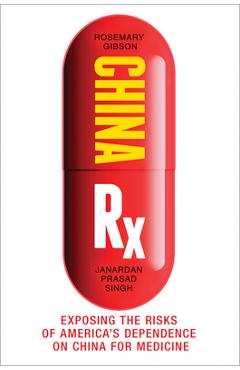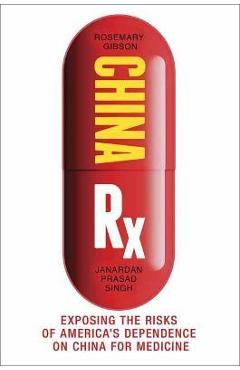China RX: Exposing the Risks of America\'s Dependence on China for Medicine - Rosemary Gibson

Detalii China RX: Exposing the Risks
libris.ro
162.75 Lei
Political Science
Rosemary Gibson
China RX: Exposing the Risks - Disponibil la libris.ro
Pe YEO găsești China RX: Exposing the Risks de la Rosemary Gibson, în categoria Political Science.
Indiferent de nevoile tale, China RX: Exposing the Risks of America\'s Dependence on China for Medicine - Rosemary Gibson din categoria Political Science îți poate aduce un echilibru perfect între calitate și preț, cu avantaje practice și moderne.
Preț: 162.75 Lei
Caracteristicile produsului China RX: Exposing the Risks
- Brand: Rosemary Gibson
- Categoria: Political Science
- Magazin: libris.ro
- Ultima actualizare: 11-04-2024 01:14:23
Comandă China RX: Exposing the Risks Online, Simplu și Rapid
Prin intermediul platformei YEO, poți comanda China RX: Exposing the Risks de la libris.ro rapid și în siguranță. Bucură-te de o experiență de cumpărături online optimizată și descoperă cele mai bune oferte actualizate constant.
Descriere magazin:
Millions of Americans are taking prescription drugs made in China and don\'t know it--and pharmaceutical companies are not eager to tell them. This is a disturbing, well-researched wake-up call for improving the current system of drug supply and manufacturing. Several decades ago, penicillin, vitamin C, and many other prescription and over-the-counter products were manufactured in the United States. But with the rise of globalization, antibiotics, antidepressants, birth control pills, blood pressure medicines, cancer drugs, among many others are made in China and sold in the United States. China\'s biggest impact on the US drug supply is making essential ingredients for thousands of medicines found in American homes and used in hospital intensive care units and operating rooms. The authors convincingly argue that there are at least two major problems with this scenario. First, it is inherently risky for the United States to become dependent on any one country as a source for vital medicines, especially given the uncertainties of geopolitics. For example, if an altercation in the South China Sea causes military personnel to be wounded, doctors may rely upon medicines with essential ingredients made by the adversary. Second, lapses in safety standards and quality control in Chinese manufacturing are a risk. Citing the concerns of FDA officials and insiders within the pharmaceutical industry, the authors document incidents of illness and death caused by contaminated medications that prompted reform. This probing book examines the implications of our reliance on China on the quality and availability of vital medicines.

Produse asemănătoare

China RX: Exposing the Risks of America\'s Dependence on China for Medicine - Rosemary Gibson
![]() libris.ro
libris.ro
Actualizat in 28/10/2025
103.98 Lei

China Rx. Exposing the Risks of America\'s Dependence on China for Medicine, Paperback/Janardan Prasad Singh
![]() elefant.ro
elefant.ro
Actualizat in 26/10/2025
122.99 Lei
Produse marca Rosemary Gibson

China RX: Exposing the Risks of America\'s Dependence on China for Medicine - Rosemary Gibson
![]() libris.ro
libris.ro
Actualizat in 28/10/2025
103.98 Lei

China RX: Exposing the Risks of America\'s Dependence on China for Medicine - Rosemary Gibson
![]() libris.ro
libris.ro
Actualizat in 11/04/2024
162.75 Lei